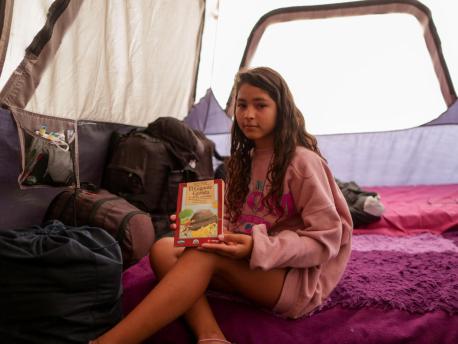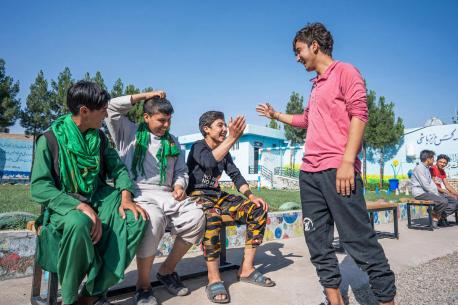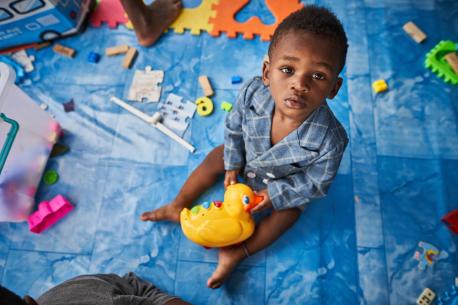
Separating Migrant Children From Their Families Is Wrong
UNICEF USA is calling on America to revise its strategies for protecting children at the border.
UNICEF USA is calling on America to revise its strategies for protecting children at the border. Children should not be punished for seeking protection and a refuge from conflict and poverty.
From April 19 to May 31, 1,995 children were separated from their parents at the border — approximately 46 children per day — according to the Department of Homeland Security (DHS). Families fleeing political and gang violence in Mexico, Honduras, Guatemala and El Salvador now face the additional trauma of losing the children they are risking their lives to protect.
The idea of punishing parents who are trying to save their children's lives, and punishing [children] for being brought to safety by their parents by separating them, is fundamentally cruel and un-American.
"The idea of punishing parents who are trying to save their children's lives, and punishing them for being brought to safety by their parents by separating them, is fundamentally cruel and un-American," Michelle Brané, director of the Migrant Rights and Justice program at the Women's Refugee Commission, an advocacy group that monitors immigration detention centers, told The New York Times. "It really to me is just a horrific 'Sophie's Choice' for a mom."
A deeply unsettling but important report from @chrislhayes: https://t.co/outd8J0IpF
— UNICEF USA (@UNICEFUSA) May 26, 2018
This is not in the best interest of this country. This is not in the best interest of children. #ProtectFamilies#childrenfirst
The U.S. has historically treated immigration violations as civil, rather than criminal, offenses, and parents have not typically been separated from their children when they enter the legal system. But when Attorney General Jeff Sessions announced a "zero tolerance" policy in April to deter Central Americans from trying to cross into the U.S., the dramatically stepped-up enforcement strategy was aimed squarely at parents traveling with their children.
Separation from family leaves children more vulnerable to exploitation and abuse, no matter what the care setting. It creates toxic stress in children and adolescents that can profoundly impact their development and increase the risk of stress-related disease well into adulthood. UNICEF and its partners are committed to keeping families together, and to reuniting families that have been separated.
Separation of a parent or primary caregiver from his or her children should never occur unless there are concerns for the safety of the child at the hand of the parent.
In March 2017, the American Academy of Pediatrics (AAP) published a policy statement advising that vulnerable immigrant children should be treated with dignity and respect and should not be exposed to conditions that may harm or traumatize them. "Separation of a parent or primary caregiver from his or her children should never occur unless there are concerns for the safety of the child at the hand of the parent," the report found.
"The Department of Homeland Security facilities do not meet the basic standards for the care of children in residential settings," the AAP warned. "Reports by advocacy organizations, including interviews with detainees and the DHS Office of Inspector General, have cataloged egregious conditions in many of the centers, including lack of bedding (e.g., sleeping on cement floors), open toilets, no bathing facilities, constant light exposure, confiscation of belongings, insufficient food and water, and lack of access to legal counsel, and a history of extremely cold temperatures."
Regardless of immigration status, children are children first and need to be treated as such.
"Children need to be defined by their age, not their borders," says Caryl Stern, President and CEO of UNICEF USA. "Regardless of immigration status, children are children first and need to be treated as such. Children bear no responsibility for the political differences in our world. Every child I've met, on both sides of our border, and around the globe, only wants to be safe and protected with hopes for a bright future."
Separating children from their families at border crossings is cruel and traumatic. This must stop — please call on your legislators to cosponsor the Keep Families Together Act now. #ProtectFamilies#FamiliesBelongTogetherhttps://t.co/3yQZsu6pPnpic.twitter.com/w5QdlPoZCW
— UNICEF USA (@UNICEFUSA) June 15, 2018
UNICEF USA has called for the protection of children at our borders since January 2017, and again in March 2017. In February 2018, UNICEF USA sent a letter to Secretary of Homeland Security Kirstjen Nielsen, encouraging her to keep children with their parents.
The Keep Families Together Act (S.3036) was developed in consultation with child welfare experts such as the AAP to ensure the federal government is acting in the best interest of children. Introduced by Senator Dianne Feinstein (D-CA), this legislation protects the welfare of children by ensuring children be separated from their parents only in the event they are being trafficked or abused by their parents.
Please contact your legislators and urge them to cosponsor the Keep Families Together Act (S.3036).
Photo at top: Fleeing violence in Honduras, 16-year-old Maria (name changed) and her younger siblings crossed the border into Mexico, where they received assistance from La Casa del Migrante, a Catholic shelter that supports migrants in Tultitlán in the State of Mexico. The children hope to be reunited with family members already living in the United States. © UNICEF/UNI176266/Ojeda
HOW TO HELP
There are many ways to make a difference
War, famine, poverty, natural disasters — threats to the world's children keep coming. But UNICEF won't stop working to keep children healthy and safe.
UNICEF works in over 190 countries and territories — more places than any other children's organization. UNICEF has the world's largest humanitarian warehouse and, when disaster strikes, can get supplies almost anywhere within 72 hours. Constantly innovating, always advocating for a better world for children, UNICEF works to ensure that every child can grow up healthy, educated, protected and respected.
Would you like to help give all children the opportunity to reach their full potential? There are many ways to get involved.





